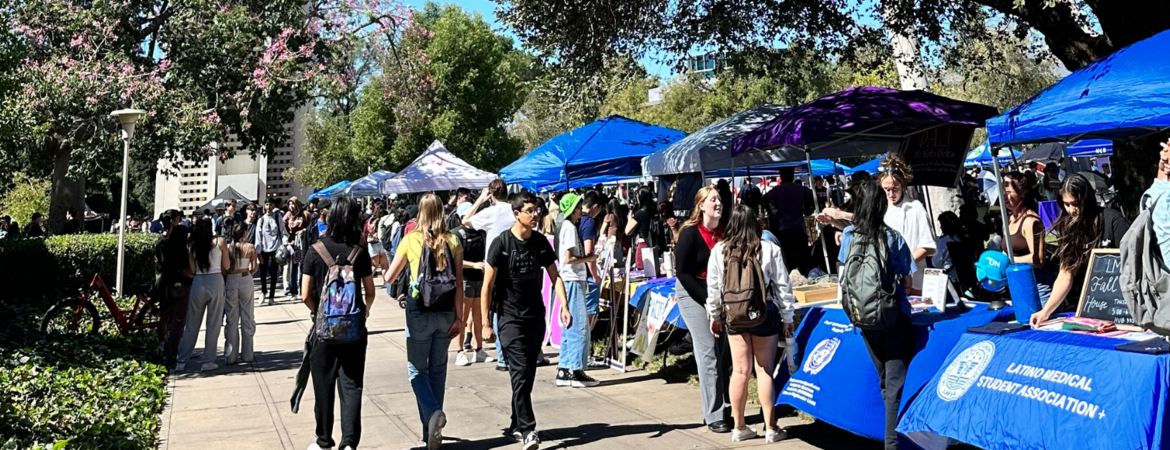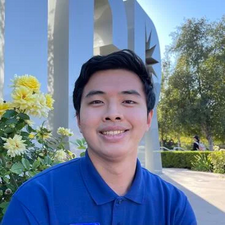
Nathaniel Co ’27, a first-year medical student at the UCR School of Medicine, is highly motivated and eager to develop skills as a clinician with an eye toward pursuing a career in internal medicine.
So motivated, in fact, that when he graduated from the UC Riverside College of Natural & Agricultural Sciences (CNAS) in Fall 2022 with a B.S. in Cell, Molecular, and Developmental Biology (CMDB), he did so two quarters earlier than the rest of his class!
“I took three courses the summer between my first and second years at the initial onset of the Covid-19 pandemic,” Nathaniel remembers, “and I was okay with taking 14-16 units of upper-division courses during my third year.”
Though hitting the gym three times a week and regular follow-ups with a therapist as a “preventative tool” also helped him mentally, it was initially not easy to balance those activities with studying and coursework demands. “Despite an increased workload, I feel less stressed than I was as an undergraduate,” he says, “and I continue to be motivated by the patient populations that I work with and seeing clinical correlations to the basic science foundation that was established during my first four years at UCR.”
Nathaniel has a solution to feeling overwhelmed by taking on too much: the key, he says, is to build effective study habits. “My first few weeks of medical school have been incredibly eye-opening in that I quickly learned how my habits as an undergraduate were slow and ineffective compared to more active forms of learning,” he remembers. “Here’s a tip: consider converting your notes into flashcards or Anki cards instead of rewriting them. Also, invest in some dry-erase markers to make concept maps on a mirror or a window to better solidify how different ideas relate to each other.”
When it comes to studying, Nathaniel stresses that flexibility is key. “Ultimately, many of us find that rather than adhering to strictly one learning style, adapting to many different modes of studying is what offers the most success across a broad range of subjects.”
Nathaniel also recommends not comparing oneself to others. “When that becomes a compulsive or chronic behavior, it can be very detrimental to our mental and overall well-being,” he says. “Everyone has different career trajectories and timelines, and the path to success is more about tumbling down different winding roads and reorienting yourself than it is about speeding through life via a straight shot.”
Nathaniel adds, “I continue to encourage current and incoming students to collaborate and maintain our campus culture of support and camaraderie. Teamwork in professional settings is infinitely more valuable than whatever actions you take to try to out-compete someone else.”
Nathaniel says his decision to enroll at UCR as an undergraduate was primarily driven by financial aid and awards which made attending a four-year institution more accessible. “I also took part in Highlander Day, and from the outset was able to see the supportive and collaborative environment fostered at UCR first-hand,” he says. “Compared to other open-house programs, I truly felt that the student body had substantial access to resources and support services.”
He also remembers, “Everyone with whom I interacted seemed to be motivated by helping each other rather than trying to out-compete one another.”
An only child who grew up in the San Gabriel Valley, Nathaniel says two cousins who attended UCR, along with the rest of his close-knit family, provided a solid support structure. “Both of my parents happen to be nurses, and one of my aunts is employed as a pharmacist,” he says. “That said, my interest in medicine was fostered both by my own interest, as well as insight into the daily lives of my family members in healthcare. I never felt pressured to become a doctor, and instead was encouraged to deeply consider my passions and interests.”
Nathaniel lived on-campus in the Pentland Hills residence hall during his first year, and then moved to the Glen Mor on-campus apartments during his third and fourth years. “During the pandemic, when all instruction was via Zoom, I was still commuting about 50 miles one-way each week to volunteer at Riverside Community Hospital, as this was the only volunteering opportunity that I found that was continuing to accept undergraduate students at the time,” he remembers.
Nathaniel found that a majority of the friends he made during freshman year were commuters, and they’ve all remained in close contact. “I didn't mind staying late with them in the commuter's lounge or in the library,” he says, “so I would encourage commuters to form study groups and find that tribe they can connect with and feel comfortable being around.”
Like many UCR alumni, Nathaniel wasn’t sure what he wanted to do when he graduated. “I wasn’t even sure whether I wanted to be a physician,” he says, “but I knew that I had some inkling to pursue a health profession. It wasn't until my first clinical volunteering experience halfway through my second year at Riverside Community Hospital that I affirmed my aspirations and knew that I wanted to become a physician.”
As a current medical student, Nathaniel says that some of the clouds of uncertainty have lifted. He knows that he wants to stay within Southern California, and looks forward to serving the Inland Empire population. “Helping to address the needs of underserved populations facing healthcare disparities has not only shown me the systemic shortcomings of our healthcare system firsthand,” he says, “but it has given me a greater appreciation and a sense of fulfillment in knowing that the care that I can provide is tailored to those who need it most.”
Nathaniel says he’s still on the fence about what specialty he’d like to pursue, but cites Family Medicine, Emergency Medicine and Anesthesiology as his top three interests. However the future for Nathaniel plays out, he says, “I look forward to assisting with health disparities research and addressing the nationwide issue of shortages in primary care.”
Now that’s motivation!
